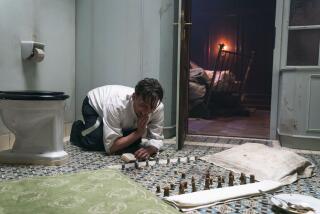Humankind Split Over Chess Showdown
- Share via
It’s unlikely that John Henry ever heard of the Sicilian Opening, but the steel-driving man who died matching his might against a steam drill would no doubt find a place in his heart for Garry Kasparov.
Kasparov, the chess grandmaster engaged in a struggle with a super-computer that knows chess gambits like the Sicilian Opening and millions more, is the latest to play out the familiar modern morality play that pits frail man against implacable machine.
It’s a battle that has split the chess world. From the classrooms of the San Fernando Valley to the game parlors of Los Angeles to the debating circuits of the Internet, rival camps are emerging: Those cheering for the computer as the harbinger of tomorrow and the partisans of Kasparov, their fellow human.
After Kasparov lost the first of six scheduled games in Philadelphia, one enthusiast lamented on the Internet that the chess master must have been “kidnapped by aliens, spent the night with a hooker, was on drugs, was drunk, or something else equally improbable.” Undaunted, he predicted a 5-1 victory for “the carbon-based organism”--meaning Kasparov and the rest of us--over the silicon-based IBM computer, Deep Blue.
Kindred spirits were Elaine Gordon’s students at Beachy Avenue Elementary School in Pacoima, who are themselves learning to play chess against a computer and have suffered their own defeats.
“I want the man to win,” said Uriel Barreda, 8.
“If the man wins, everybody’s going to be proud of him because he beat the hardest, smartest computer in the world,” agreed Juan Garcia, 10. “But if the computer wins, who can be proud of it?”
Lots of people, apparently.
“For you carbon enthusiasts who insist on playing a game where silicon can’t compete, I guess you’ll have to switch” to another game, gloated one Internet writer after the first-game defeat of Kasparov. (He came back to win Game 2, and played the computer to a draw in Games 3 and 4.)
Then there were those who saw the triumph of the computer in more apocalyptic terms.
“Very sad news for the human species,” said one.
So sad was he that this computer correspondent appended a morose line from Shakespeare, about the eventual fall of the mighty. “O, gentlemen, the time of life is short! And if we live, we live to tread on kings.”
Most of David Esser’s customers at the Gym for the Mind, an exercise club and game room in Woodland Hills, feel the same. Esser, 48, said their glum faces and dour predictions are a bit much, asking: “What if after Galileo” pointed his pioneering telescope skyward in 1609 “everybody said, ‘What a sad thing for human eyes?’ ”
He said he is excited to be a part of the historical moment when a human being is no longer the world’s best chess player. He is especially thrilled at the possibility of delving deeper into the mysteries of chess.
To him, it doesn’t matter if he can’t have a cup of coffee with his tutor after the match.
“The first game the computer played was a masterpiece,” Esser said. “It did some things that had never been seen before.”
For instance, the second move, which gave Kasparov the early advantage. Skilled chess players have always considered the move laughably inept, Esser said, but the computer saw more deeply into the game and used the move to draw Kasparov out, then beat him back.
“I’ve been waiting for this for 20 years,” Esser said.
Others have feared it a lot longer, probably since the first protohuman picked up a stick and used it to dig a hole, thereby making fingernails old-fashioned. Of course, mankind has much more at stake in a test of mental agility than in one of brute strength. It’s brainpower, after all, that allowed a small mammal that wouldn’t have made a decent nighttime snack for T. Rex to evolve into the world’s most dominant creature.
So if Kasparov loses, would that signal the end of humanity’s reign?
“Of course not. This is only the betterment of it,” said Kelly Fitzgerald, a spokeswoman for IBM. “Nothing will ever replace the human brain.”
After all, it was a human brain that figured out there would be lots of interest in such a match. And it was a lot of human brains at IBM that built the computer and were celebrating their smashing success in holding off Kasparov so far.
“There is an unbelievable amount of interest,” said Fitzgerald, speaking from the site of the matches.
She said the Web site set up on the Internet by IBM to provide information and a running commentary on the matches has received millions of inquiries. Journalists from around the world have flown in, and hundreds more people packed a room to watch the matches in person and debate the latest strategies by man and microcircuit.
Watching from afar at Hale Middle School in Woodland Hills, student favorites depended on their own experiences, said Mark Schatkun, 43, a librarian who sponsors the school chess club. Those who had played the computer in the library were certain Kasparov could not win. Those who had never played the computer had more faith in the human species.
Unlike Esser, some observers were suspicious of Kasparov’s loss. They thought it smacked too much of a publicity stunt designed to pump up world interest in a slow board game that many find about as exciting to watch as the Pillsbury Bakeoff.
“Well, since Kasparov decided, for whatever reason, to throw the first game . . .” began one critic.
These skeptics argued that even if Deep Blue can perform 20 billion calculations in a single match, and can plan 10 to 12 moves ahead, computers can never develop the imaginations of a chess master such as Kasparov.
“Was he paid to give Deep Blue every possible chance to win?” asked one online doubter. “He violated just about every possible rule one follows when playing against a computer.”
Fitzgerald scoffed at the idea that Kasparov might have thrown the first match. She said he was impressed by Deep Blue’s power. “He said it was a well-designed machine,” she said.
Many of those engaged in the man-versus-machine debate were interested in the outcome purely as an intellectual exercise. They wanted to know how far IBM’s programmers had carried the technology in the seven years since Kasparov rather easily defeated Deep Blue’s predecessor, Deep Thought.
Deep Blue was built and programmed specifically for chess, and has the ability to learn from its experience so it won’t fall for the same trap twice. Construction of a computer that could actually outplay the best of human chess masters has long been a goal for some computer scientists who believe it would signal a new sophistication in the way computers attack problems.
But for some, the contest had almost religious significance. To these folks, it wasn’t merely a man against a giant pocket calculator. It was the horse against the locomotive, the washboard versus the washing machine, compact discs versus vinyl records, and humanity versus the dark forces of technology that would reduce all mysteries to mathematics.
Even if Kasparov ultimately prevails, they argue, it is only a matter of time before computers take over.
“Deep Blue will beat Kasparov!!!” said one. “But I don’t think it will win the 1996 matchup. Maybe the 2000 matchup.”
A fitting date for the Apocalypse. But Esser is not wasting time crying for carbon. He welcomes the new age of silicon. As if he had seen this coming, he designed his own chess pieces a while back, using familiar images to replace the traditional knight and bishop.
So who was the king? Who else but Arnold Schwarzenegger, the ultimate machine nightmare for humanity in the film “The Terminator.”
“Checkmate, baby.”
* RELATED STORY: A29
More to Read
Sign up for Essential California
The most important California stories and recommendations in your inbox every morning.
You may occasionally receive promotional content from the Los Angeles Times.












